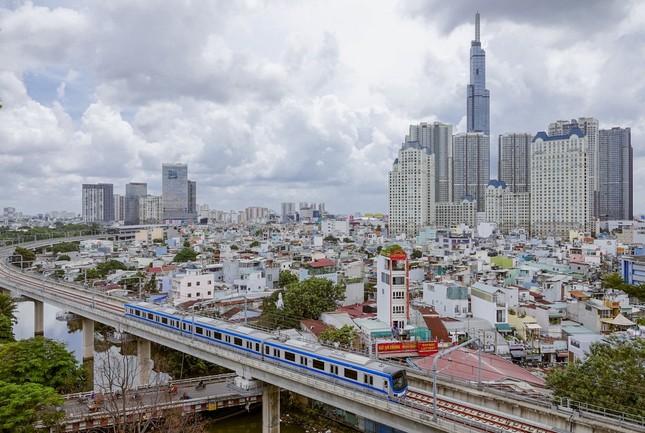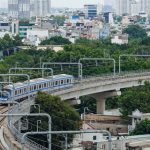According to the Ho Chi Minh City Urban Railway Management Authority (MAUR), the resolution of issues between MAUR and contractor Hitachi has been addressed with solutions agreed upon by both the investor and the contractor.
Specifically, the investor has proposed a temporary payment solution for the costs requested by the contractor, Hitachi, regarding the use of their equipment for staff training and the trial operation phase (80% of the cost assessed as appropriate by consultants). The final cost and entitlement to this cost will be decided by the Dispute Adjudication Board (DAB) or Commercial Arbitration.

The project has a total investment (after adjustment) of VND 43,700 billion (Photo: Duy Anh)
Currently, Hitachi has coordinated with relevant parties to hand over the trains and equipment for staff training on the actual line of the Ho Chi Minh City Urban Railway One-Member Limited Company from August 15th. This will be followed by the trial operation phase (Trial-Run) while also serving the system safety certification process, aiming to complete the project by the end of 2024.
Regarding Hitachi’s request to establish a Dispute Adjudication Board (DAB), the MAUR is reviewing and strengthening the legal framework, complying with Vietnamese law and international treaties on the mechanism of operation, decision-making authority, cost mechanism, and other related issues concerning the establishment of the DAB.
The Urban Railway Management Authority stated that, fundamentally, the issues related to the project’s obstacles have been addressed through the investor’s collaboration with relevant units to implement a harmonious and amicable solution, in line with international practices and Vietnamese law, with a determination to ensure the project’s progress.
On April 6, 2023, Hitachi filed a lawsuit against the investor at the Vietnam International Arbitration Center (VIAC), requesting an extension of at least 2,773 days and compensation of approximately VND 527 billion. Hitachi has sought additional costs for the time extension, amounting to approximately JPY 23,721 billion (nearly VND 4,000 billion).
The Key to Unlocking Saigon’s Infrastructure Potential
The first urban railway line (metro) of Ho Chi Minh City is set to commence commercial operations by the end of this year. With the valuable insights gained from this project, the city is now planning to refine the master plan for its metro system. The aim is to transform the city’s transport infrastructure, befitting its stature as the country’s economic powerhouse, within the next decade.
A Visionary’s Legacy: The Impact of Vu Tien Loc on Vietnam’s Business Community
With a distinguished career, Vu Tien Loc has made a significant impact during his tenure. His contributions to the business community are noteworthy, leaving a lasting impression on the legislative landscape.
Why Did Ho Chi Minh City’s Metro Line 1 Delay Trial Operations?
The highly anticipated Metro Line 1 in Ho Chi Minh City has hit a slight bump in the road, with the trial run now delayed by three months. Originally slated for July, the new metro line will now undergo testing in October. This postponement is a minor setback for the city’s ambitious plans to revolutionize its public transport system, but it’s important to ensure that every aspect of the metro is meticulously scrutinized before it opens to the public.


















